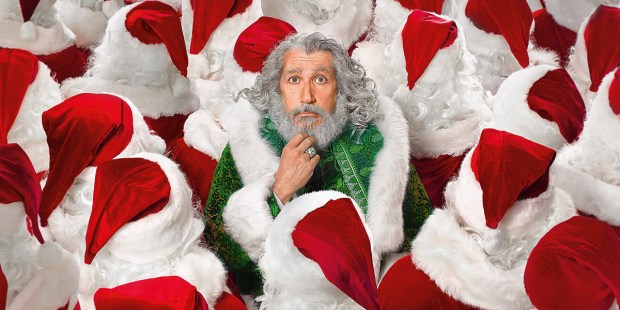An Italian Catholic bishop made international headlines earlier this month when he told children from the pulpit that Santa Claus doesn’t exist.
Bishop Antonio Stagliano, speaking on the feast of St. Nicholas, flatly told a group of shocked youngsters that Santa isn’t real. He even went so far as to say, “In fact, I would add that the red of the suit he wears was chosen by Coca-Cola exclusively for advertising purposes."
The remarks were so controversial that the spokesman of the Diocese of Noto quickly took to Facebook to apologize on behalf of the bishop. Alexander Paolino said, “I express first of all, on behalf of the Bishop, regret for this statement that has generated disappointment in children, wanting to clarify that the intentions of Monsignor Staglianò were quite different, that is, to reflect with greater awareness on the meaning of Christmas and the beautiful traditions that accompany it.”
Catholic families all over the world, however, take a different approach to how they handle the Santa tradition. Some parents are steadfastly against the tradition, but others believe in the goodness of the custom. Here are the two sides of the argument as we see it at Aleteia.

Against the Santa Claus tradition
The Santa tradition makes it harder for parents to keep the focus on Jesus and the Nativity when there's a lot of excitement about a man in a red suit and presents (which in actual truth, he doesn't bring).
Furthermore, encouraging parents, other adults, and older kids to say they believe in Santa Claus or otherwise propagate the Santa story is effectively lying to children.
Santa can make it more difficult for children to believe in an invisible God when they are being told throughout their childhood that other invisible figures like Santa (and the Easter Bunny, Tooth Fairy, etc) are real.
The Santa tradition sets children up for a big let down when they learn Santa Claus isn't real. Some kids feel betrayed and embarrassed when this happens. They might well ask: What other fantasies have their parents fed to them?
The excesses of Santa Claus gift-giving tends to encourage more commercialism and focus on presents rather than giving to others, family time, traditions, and the spiritual meaning.
The Santa tradition is a betrayal of St. Nicholas, who was an actual historical figure. At its worst, it confuses Catholic devotion to the saints, mixing up real saints and mythical heroes.
Finally, many parents use the Santa tradition as a disciplinary crutch. By threatening the loss of magic presents, parents misuse rewards to encourage good behavior.

For the Santa tradition
The Santa tradition encourages children to believe in something that is not strictly tangible. Therefore it strengthens the idea of believing in God (among younger children). By the time kids no longer believe in Santa they’ll often have received a religious education that will have strengthened their faith and ability to believe in God anyway.
Additionally, consider that Santa Claus is perhaps our culture’s most generous and kind figure who helps to reinforce how special the season is, ending with the most precious gift of all!
We can teach our kids that the Santas we see out and about are a representation of the real St Nicholas. If a kid loves Santa and they know St Nick’s story, they may be encouraged to love Jesus even more. (Kids do have a habit of emulating!)
The excitement and wonder at seeing a pile of presents only emphasizes the happiness we feel at Jesus’ birth. It’s a double-whammy of joy. It’s a positive association that will last in a child’s memory for life.
The joy a child feels at receiving presents at Christmas is very real to them, which makes it easier for them to feel empathy for those who have less, or nothing at all. This can encourage them to feel and be more charitable.
When children discover Santa isn’t real, they needn’t necessarily conclude that they’ve been lied to. They may very well pause and consider that their loving parents gave them so many gifts over the years and didn’t take the credit for it!
Finally, the Santa tradition doesn’t have to be excessively commercial. Parents can make responsible decisions as to what they buy their kids. Some parents even have Santa deliver little gifts like toothbrushes, which are things they actually need.
In the end, whether or not a family chooses to live the Santa tradition and the customary exchange of presents, the greatest gift has been given.
As Pope Leo the Great writes, “Our Saviour, dearly-beloved, was born today: let us be glad. For there is no proper place for sadness, when we keep the birthday of the Life, which destroys the fear of mortality and brings to us the joy of promised eternity. No one is kept from sharing in this happiness.”








